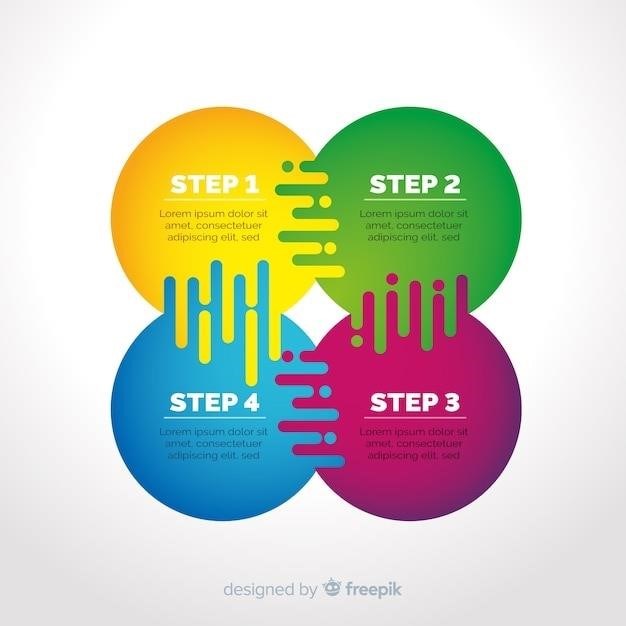

The Four Agreements by Don Miguel Ruiz⁚ A Comprehensive Guide
Don Miguel Ruiz’s “The Four Agreements” offers a practical guide to personal freedom using Toltec wisdom. This influential self-help book‚ available in PDF format‚ outlines four principles for improving communication‚ relationships‚ and overall well-being. Millions have found its message transformative.
Availability of The Four Agreements in PDF Format
Locating “The Four Agreements” by Don Miguel Ruiz in PDF format presents a blend of convenience and caution. While numerous websites offer free downloads‚ navigating this landscape requires discernment. Legitimate sources may include online bookstores offering digital copies‚ sometimes as part of a subscription service. However‚ many unofficial sources exist‚ potentially distributing pirated versions or files containing malware. Be wary of sites lacking clear identification or those promising free downloads with suspicious links. Always prioritize reputable sources to ensure a safe and legal download. Remember‚ supporting the author directly through authorized channels not only provides a legitimate copy but also contributes to the continued creation of valuable content. The availability of the PDF version itself is widespread‚ but the legitimacy and safety of accessing such versions should always be carefully considered.
Downloading The Four Agreements PDF⁚ Legitimate Sources and Risks
Downloading “The Four Agreements” PDF requires caution. While readily available online‚ many sources are unreliable. Legitimate options include purchasing the ebook directly from online retailers like Amazon or through the publisher’s website. These ensure you receive an authorized‚ virus-free copy and support the author. Free downloads from less reputable sites pose risks. These may include malware infections‚ corrupted files‚ or simply inferior quality versions. Be wary of sites with excessive ads‚ poor grammar‚ or unclear terms of service. Always check reviews and ratings before downloading from unfamiliar sources. Prioritizing safety and legality is paramount. A legitimate download guarantees an enjoyable reading experience without compromising your device’s security. Remember‚ a small investment in an authorized copy protects you and supports the author’s work.
The Four Agreements⁚ Key Principles and Their Significance
At the heart of Don Miguel Ruiz’s “The Four Agreements” lie four simple yet profound principles for personal transformation. “Be Impeccable with Your Word” emphasizes the power of mindful communication‚ urging readers to speak with integrity and avoid harmful gossip or self-limiting language. “Don’t Take Anything Personally” encourages detachment from others’ opinions and actions‚ recognizing that their behavior reflects their own beliefs‚ not a personal judgment. “Don’t Make Assumptions” stresses the importance of clear communication and avoiding interpretations that lead to conflict. Finally‚ “Always Do Your Best” promotes self-compassion and striving for excellence while acknowledging limitations. These interconnected principles‚ rooted in ancient Toltec wisdom‚ offer a practical framework for navigating relationships‚ managing emotions‚ and achieving personal growth. The significance lies in their ability to foster self-awareness‚ improve communication‚ and cultivate a more fulfilling life.
Be Impeccable with Your Word⁚ Understanding and Implementing
The first agreement‚ “Be Impeccable with Your Word‚” is a cornerstone of personal responsibility and ethical communication. It encourages speaking truthfully and with consideration‚ avoiding the use of language that harms oneself or others. This doesn’t simply mean telling the truth; it also involves choosing words carefully‚ avoiding gossip and judgments. Implementing this agreement requires self-awareness – pausing to reflect before speaking‚ considering the impact of our words‚ and choosing to communicate with kindness and respect. It involves taking responsibility for our communication and understanding the power of our words to create or destroy. By becoming impeccable with our word‚ we cultivate trust‚ build stronger relationships‚ and foster a more positive environment‚ both internally and externally. This practice extends to our inner dialogue‚ promoting self-compassion and positive self-talk. The goal is conscious communication that uplifts rather than diminishes.
Don’t Take Anything Personally⁚ The Power of Detachment
The second agreement‚ “Don’t Take Anything Personally‚” emphasizes the importance of emotional detachment. It teaches that others’ actions and opinions are projections of their own reality‚ not reflections of our inherent worth. When we take things personally‚ we internalize criticisms and judgments‚ leading to unnecessary suffering and emotional distress. This agreement encourages us to recognize that others’ behavior stems from their own beliefs‚ fears‚ and experiences‚ not from any inherent flaw within ourselves. By practicing detachment‚ we free ourselves from the burden of others’ negativity and judgments‚ cultivating emotional resilience and self-acceptance. It does not mean becoming indifferent‚ but rather understanding that external opinions do not define our self-worth. Developing this capacity allows us to respond to situations calmly and rationally‚ without allowing others’ actions to dictate our emotional state. This fosters personal growth and inner peace‚ enabling us to focus on our own journey and personal development.
Don’t Make Assumptions⁚ The Importance of Clear Communication
The third agreement‚ “Don’t Make Assumptions‚” highlights the crucial role of clear communication in fostering healthy relationships and avoiding misunderstandings. It emphasizes the dangers of jumping to conclusions and interpreting situations based on our own biases and preconceived notions. Assumptions often lead to conflict and hurt feelings‚ as they create a disconnect between our perceived reality and the actual situation. This agreement encourages open and honest dialogue‚ urging us to clarify our understanding and seek clarification when needed. Instead of assuming intentions or meanings‚ we are encouraged to directly ask questions and express our needs. This approach promotes trust and understanding‚ preventing misunderstandings that might arise from unspoken expectations. By actively seeking clarity and communicating openly‚ we can foster healthier relationships and build stronger connections with others. The emphasis is placed on the importance of clear‚ direct communication to ensure mutual understanding and prevent the creation of unnecessary conflict.

Always Do Your Best⁚ Striving for Excellence and Self-Compassion
The final agreement‚ “Always Do Your Best‚” focuses on the importance of self-compassion and striving for excellence without self-judgment. It encourages us to approach tasks and challenges with our full capacity‚ understanding that our “best” may fluctuate depending on our physical‚ emotional‚ and mental state. The key is to give our utmost effort in any given moment‚ without attaching our self-worth to the outcome. This agreement promotes self-acceptance and encourages us to forgive ourselves for shortcomings‚ recognizing that perfection is unattainable. Instead of focusing on self-criticism‚ it encourages self-forgiveness and a continuous striving for improvement. By accepting our limitations and celebrating our progress‚ we cultivate a more positive and compassionate relationship with ourselves‚ leading to greater self-esteem and resilience in the face of challenges. The focus is on consistent effort and self-compassion‚ rather than the achievement of flawless results.
The Toltec Wisdom Behind The Four Agreements
The Four Agreements are rooted in the ancient Toltec wisdom‚ a spiritual tradition from pre-Hispanic Mexico. Don Miguel Ruiz‚ drawing from his Toltec heritage‚ presents these agreements not as mere rules‚ but as tools for personal transformation. Toltec philosophy emphasizes the importance of self-awareness and personal responsibility in shaping our reality. The agreements are designed to help us break free from limiting beliefs and self-defeating patterns inherited through cultural conditioning and personal experiences. By understanding the energy we project into the world through our words‚ thoughts‚ and actions‚ we can create a more fulfilling and harmonious life. The ancient Toltec practices focus on inner peace and self-mastery. Ruiz interprets this ancient wisdom for a modern audience‚ making it accessible and applicable to everyday life. The emphasis is on personal freedom achieved through mindful self-reflection and conscious choices aligned with Toltec principles.
The Four Agreements’ Impact on Personal Freedom and Happiness
The Four Agreements’ profound impact lies in its potential to unlock personal freedom and cultivate lasting happiness. By adhering to these principles – impeccability with words‚ avoiding taking things personally‚ abstaining from assumptions‚ and always doing one’s best – individuals can significantly transform their lives. The book empowers readers to break free from self-limiting beliefs and the negative effects of others’ opinions. Practicing these agreements fosters healthier communication‚ stronger relationships‚ and increased self-awareness. This‚ in turn‚ leads to greater self-esteem‚ reduced stress‚ and a more positive outlook on life. The emphasis on personal responsibility and conscious choices enables readers to take control of their emotional responses and reactions‚ creating a more fulfilling and joyful existence. The cumulative effect of consistently applying these agreements fosters a sense of liberation and inner peace‚ paving the way for a more authentic and meaningful life journey. Many readers report significant improvements in their overall well-being after integrating these principles into their daily lives. The book’s enduring popularity is a testament to its transformative power.
Criticisms and Controversies Surrounding The Four Agreements
Despite its widespread popularity‚ “The Four Agreements” has faced criticism. Some argue the book’s Toltec origins are overly romanticized and lack historical accuracy‚ potentially misrepresenting ancient cultures. Critics also point to a lack of scientific evidence supporting the claims made regarding personal transformation. The simplicity of the agreements‚ while appealing to many‚ has been criticized as overly simplistic and lacking the nuanced approach needed for complex interpersonal issues. The self-help nature of the book also draws criticism‚ with some arguing it offers limited practical solutions for deep-seated psychological problems. Concerns have been raised about the potential for misinterpretation‚ leading to unrealistic expectations and self-blame. Furthermore‚ the book’s focus on individual responsibility might downplay systemic issues contributing to personal struggles. While the agreements promote self-improvement‚ some argue this focus can overshadow the need for societal change. These criticisms‚ however‚ do not diminish the book’s significant influence and impact on millions who find its message of personal responsibility and mindful communication profoundly helpful.
The Four Agreements⁚ A Lasting Legacy in Self-Help Literature
Don Miguel Ruiz’s “The Four Agreements” has secured a lasting place in self-help literature‚ impacting millions worldwide. Its enduring appeal stems from its accessible yet profound message‚ offering a practical framework for personal growth and improved relationships. The book’s simple yet powerful principles resonate across diverse cultures and backgrounds‚ making it a timeless guide for navigating life’s challenges. Its widespread availability in various formats‚ including PDF‚ has further cemented its accessibility and influence. The book’s ongoing popularity and continued discussions online demonstrate its lasting impact‚ inspiring countless individuals to implement the agreements into their daily lives. Its enduring legacy lies not only in its sales figures but in the countless stories of transformation and personal growth it has inspired. The Four Agreements continues to serve as a valuable resource for self-reflection and personal development‚ establishing itself as a cornerstone in the self-help genre. Its message of personal responsibility‚ mindful communication‚ and striving for excellence has left an undeniable mark on contemporary self-help philosophy.